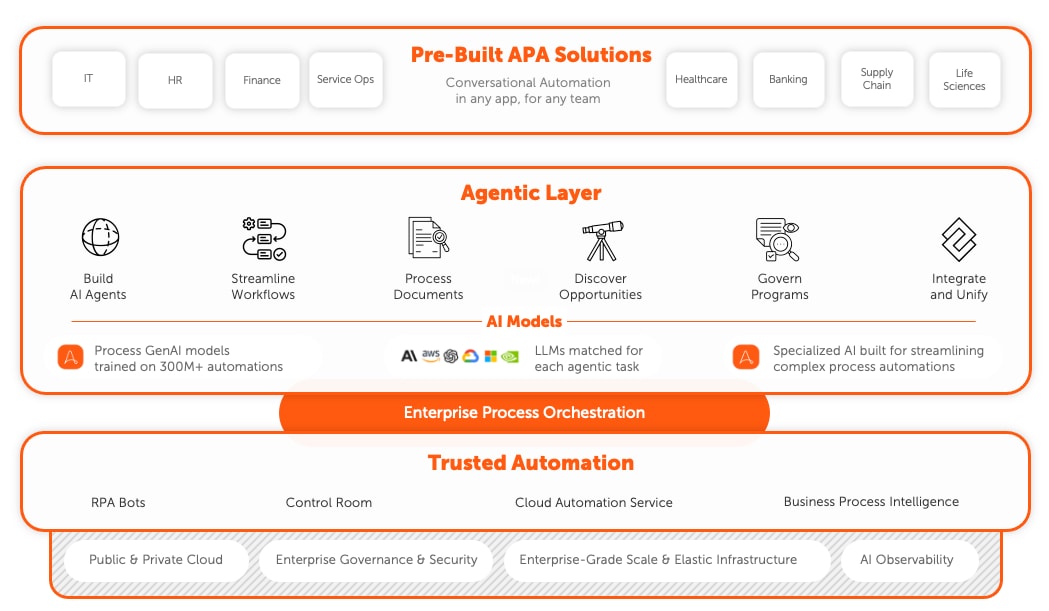What are the benefits of process intelligence?
Process intelligence enables you to see and decode the way work happens today to accelerate automation and optimize for operational excellence at scale.
Accelerate automation
with insight into the business processes and workflows with high automation potential.
Improve operational efficiency
with deep process data to reveal a clear roadmap to unblock employee productivity and drive operational excellence.
Reduce costs
with a data-driven approach to identifying and eliminating inefficiencies that drain resources and inflate expenses.
Uncover optimal process
paths with a digital twin of operations to pinpoint and simulate more efficient routes that drive better outcomes.
Improve compliance and governance
with the granular process visibility needed to identify and rectify compliance risks before they escalate.
How does process intelligence work?
Your business runs on processes. But most businesses don’t know how their processes really work and where people, applications, and data interact. The reality is business processes change over time as adaptations make a patchwork of the original workflow, and inefficiencies and redundancies creep in. At scale, this fragmented process landscape has major implications for productivity and the ability to transform.
Process intelligence uses computer vision, artificial intelligence (AI), machine learning (ML), and natural language processing to continuously observe and interpret digital activities across all applications and departments throughout an organization. The result is a real-time detailed map of every digital process across the enterprise.
Collect
Capture process data across all systems and applications.
Aggregate
Compile all enterprise-wide process observations.
Clean
Transform unstructured process screenshots into structured information.
Analyze
Interpret and contextualize granular process data into visualizations and reports.
Action/Automate
Utilize insights to inform decisions and create/optimize automations.
Where are enterprises applying process intelligence?
Process intelligence helps companies across industries eliminate process unknowns to better plan and execute business process automation and shorten the runway to digital transformation.
Uncover process details and inconsistencies in financial services processes to inform risk management, improve on-time delivery of regulatory filings, and strengthen process controls, e.g., BSA AML / KYC.
Map the path to optimal patient flow in healthcare settings, faster claims processing, and streamlined policy issuance and underwriting.
Get clarity on process hiccups and bottlenecks to enable accelerating clinical trials, improve GCP/GMP compliance, and optimize pharmacovigilance (PV) and AE reporting.
Leverage end-to-end process visibility to optimize employee onboarding, accelerate training and development, and improve staffing and shift management.
Harness process insights to eliminate inefficiencies across accounting operations, accelerate financial close and consolidation, automate report generation, and improve compliance.
Find out exactly how to optimize customer service workflows to speed resolution times, streamline returns processing, and increase responsiveness to customer requests.
What are the advantages of process intelligence compared with other tools?
From task mining to process discovery, many tools exist to uncover and understand enterprise operations. The unique power of process intelligence lies in creating a continuous, accurate map of enterprise processes at scale.
Speed
Combining automation and AI to uncover processes and analyze workflows reduces time to intelligence by 90%. Process intelligence helps businesses by delivering fast, automatic, continuous process data revealing the current state of business processes. It maps out the actual process workflow to show exactly which digital tasks people spend time on and where. This insight allows you to focus on specific segments of the process that could return the most value, impact, or time through redesign or automation.
Scale
Until recently, obtaining and analyzing real-time process data across enterprise operations was not achievable, even as digital acceleration necessitated a holistic, enterprise-wide understanding of processes to transform and automate workflows. Filling this need, process intelligence works at enterprise scale. It is able to deliver continuous, granular, operations-wide data capture and process analysis.
Accuracy
Some tools for process understanding are limited to a specific data set, such as event logs, resulting in process maps that can miss essential components of process workflows. By collecting and analyzing processes across people, systems, and data— and the ways they interact—process intelligence is able to deliver 100% complete process understanding with no bias or errors.
Efficiency
Process intelligence is non-invasive, requiring no integrations with existing systems. This lightweight deployment enables frictionless data collection with zero workflow disruption. The result is a high-efficiency, high-speed solution to understanding organizational processes at scale.
Your process intelligence journey.
Put process intelligence to work alongside Intelligent Automation as part of your overarching digital transformation strategy.
Goals
Establish your transformation objectives.
The process intelligence journey is part of your digital transformation strategy. At the outset, establish where process intelligence fits within the organization's broader vision for operational change. Include stakeholders to establish a full picture of the goals process intelligence is intended to help you achieve, as well as lay the foundation for future change management driven by anticipated process insights.
Partner
Choose a solution that dovetails with Intelligent Automation.
Process intelligence is a central tool in the automation of business processes. Selecting a process intelligence solution that comes embedded within an Intelligent Automation platform will allow organizations to quickly and securely uncover, comprehend, and analyze existing processes and directly translate insights into automated processes. Process intelligence accelerates automation initiatives as part of process discovery by providing the depth of insight needed to inform effective process optimization and AI-assisted automation.
Intelligence
Deploy process intelligence.
Put process intelligence tools to work and see how enterprise processes operate in real time. Uncover not only the processes themselves but also variations across teams and regions to build an enterprise-wide map of operations down to the granular, day-to-day level, where people, apps, and data interact. This organization-wide process map allows you to pinpoint inefficiencies, reveal optimal process paths, and ultimately reduce time to automation. All at enterprise scale.
Transformation
Harness insights to redesign processes and automate.
Utilize the detail uncovered through process intelligence to drive operational improvements through process transformation. With process intelligence data, you can identify high-efficiency teams and see where automation can improve business outcomes, such as improving customer experience and compliance.
Where process intelligence fits within Intelligent Automation.
Process intelligence delivers the most value within Process Discovery as part of a complete Intelligent Automation solution that supports the end-to-end automation journey, spanning people, systems integration, security, and scalability.

Frequently asked questions.
How does process intelligence relate to intelligent automation (IA)?
Process intelligence is part of the end-to-end Intelligent Automation journey to automate enterprise business processes at scale. Process intelligence feeds into the discovery of business processes to identify and uncover workflows in order to optimize and automate. Intelligent Automation platforms often include process intelligence tools to accelerate the discovery-to-automation lifecycle.
How does process intelligence relate to robotic process automation (RPA)?
Process intelligence works in tandem with robotic process automation (RPA) as part of end-to-end business process automation. RPA is software that automates the execution of rules-based business processes. Process intelligence does not itself automate or execute digital work tasks, but the process logic mapped through process intelligence feeds into the automation of business processes with RPA.
Process intelligence vs. process discovery - what’s the difference?
Process intelligence is a component of process discovery. Process discovery combines task mining with process intelligence capabilities (e.g., computer vision and AI) to accurately and clearly map the current state of business processes.
Process intelligence vs. process mining - what’s the difference?
The difference between process intelligence and process mining is primarily in scope. Process mining deeply analyzes process data to create a retrospective view of the way processes work. Process intelligence expands beyond process mining to include AI-driven insights and monitoring in order to understand process variations in real time.







